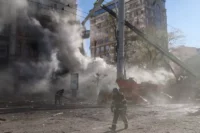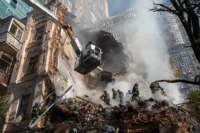
Don’t Rule Out Diplomacy in Ukraine
U.S. President Joe Biden has said that the United States is committed to a negotiated end to the war in Ukraine. But his administration has taken few, if any, steps to create a diplomatic process that could produce such an outcome. Buoyed by Ukrainian battlefield successes and horrified by Russian atrocities, the United States seems committed to continuing its current approach of helping Ukraine recapture as much territory as possible without provoking a wider war. The mantra in Washington is to support Kyiv “for as long it takes” and to rule out, at least for now, practical steps toward diplomacy. That message was reinforced this week when 30 Democrats in the U.S.… Seguir leyendo »















